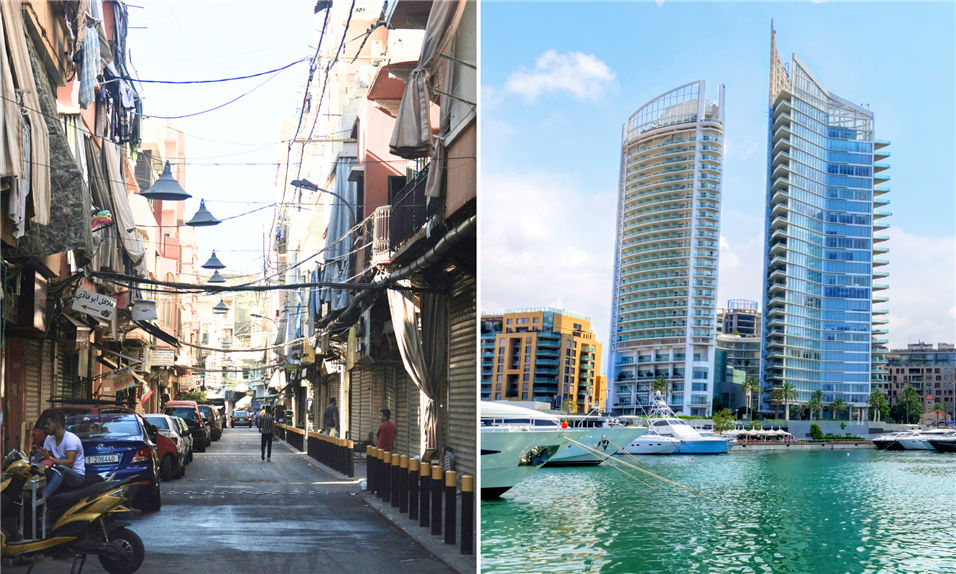Rebuilding Lebanon: Strategies to Address Income Disparities and Foster Social Stability
- Lina S. Maddah, Wael Al Achkar, Andrios Neaimeh
In this policy brief, Lina Maddah, Wael Al Achkar, and Andrios Neaimeh examine the sharp rise in income inequality in Lebanon, driven by political mismanagement, corruption, and successive crises including the COVID-19 pandemic and the Beirut port explosion. They highlight how regressive taxation, collapsing public services, and a growing informal labor market have deepened poverty and eroded access to healthcare, education, and social protection—especially for vulnerable groups. To address these challenges, the brief recommends progressive tax reforms, stronger social safety nets, investment in public services, and structural economic reforms to promote equity, social cohesion, and long-term stability.
Lina S. Maddah
is a Senior Economic Researcher at the Lebanese Center for Policy Studies. Her areas of work include Urban and Regional Economics, Firm Dynamics, Spatial Economic Analysis, Cultural and Creative Industries, and Local Entrepreneurship Ecosystems. Lina holds a Ph.D. in Economics from Universitat Rovira i Virgili, Spain, and is an Adjunct Professor at the Department of Economics at the Lebanese American University.
Wael Al Achkar
is a Research Economist at the Chamber of Commerce, Industry, and
Agriculture of Beirut and Mount Lebanon. He holds an M.A. in Applied Economics
and a B.S. in Economics from the Lebanese American University (LAU). His research
interests include trade dynamics and firms’ export performance.
Andrios Neaimeh
is an economist and researcher. He holds a Master’s degree in Applied Economics from the Lebanese American University and has conducted research on topics including income inequality, human capital, and the impact of global commodity prices on Lebanon’s economy. He currently teaches undergraduate economics courses at Université La Sagesse and serves as an Information Management Officer at Oxfam.
 In this policy brief, Lina Maddah, Wael Al Achkar, and Andrios Neaimeh examine the sharp rise in income inequality in Lebanon, driven by political mismanagement, corruption, and successive crises including the COVID-19 pandemic and the Beirut port explosion. They highlight how regressive taxation, collapsing public services, and a growing informal labor market have deepened poverty and eroded access to healthcare, education, and social protection—especially for vulnerable groups. To address these challenges, the brief recommends progressive tax reforms, stronger social safety nets, investment in public services, and structural economic reforms to promote equity, social cohesion, and long-term stability.Lina S. Maddah is a Senior Economic Researcher at the Lebanese Center for Policy Studies. Her areas of work include Urban and Regional Economics, Firm Dynamics, Spatial Economic Analysis, Cultural and Creative Industries, and Local Entrepreneurship Ecosystems. Lina holds a Ph.D. in Economics from Universitat Rovira i Virgili, Spain, and is an Adjunct Professor at the Department of Economics at the Lebanese American University.Wael Al Achkar is a Research Economist at the Chamber of Commerce, Industry, and Agriculture of Beirut and Mount Lebanon. He holds an M.A. in Applied Economics and a B.S. in Economics from the Lebanese American University (LAU). His research interests include trade dynamics and firms’ export performance.Andrios Neaimeh is an economist and researcher. He holds a Master’s degree in Applied Economics from the Lebanese American University and has conducted research on topics including income inequality, human capital, and the impact of global commodity prices on Lebanon’s economy. He currently teaches undergraduate economics courses at Université La Sagesse and serves as an Information Management Officer at Oxfam.
In this policy brief, Lina Maddah, Wael Al Achkar, and Andrios Neaimeh examine the sharp rise in income inequality in Lebanon, driven by political mismanagement, corruption, and successive crises including the COVID-19 pandemic and the Beirut port explosion. They highlight how regressive taxation, collapsing public services, and a growing informal labor market have deepened poverty and eroded access to healthcare, education, and social protection—especially for vulnerable groups. To address these challenges, the brief recommends progressive tax reforms, stronger social safety nets, investment in public services, and structural economic reforms to promote equity, social cohesion, and long-term stability.Lina S. Maddah is a Senior Economic Researcher at the Lebanese Center for Policy Studies. Her areas of work include Urban and Regional Economics, Firm Dynamics, Spatial Economic Analysis, Cultural and Creative Industries, and Local Entrepreneurship Ecosystems. Lina holds a Ph.D. in Economics from Universitat Rovira i Virgili, Spain, and is an Adjunct Professor at the Department of Economics at the Lebanese American University.Wael Al Achkar is a Research Economist at the Chamber of Commerce, Industry, and Agriculture of Beirut and Mount Lebanon. He holds an M.A. in Applied Economics and a B.S. in Economics from the Lebanese American University (LAU). His research interests include trade dynamics and firms’ export performance.Andrios Neaimeh is an economist and researcher. He holds a Master’s degree in Applied Economics from the Lebanese American University and has conducted research on topics including income inequality, human capital, and the impact of global commodity prices on Lebanon’s economy. He currently teaches undergraduate economics courses at Université La Sagesse and serves as an Information Management Officer at Oxfam.